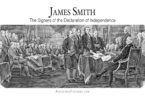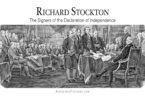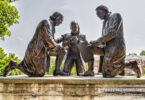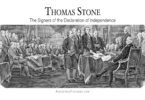William Williams was born in 1731 in Lebanon, Connecticut. The son of minister Solomon Williams and Mary Porter, William studied theology and law at Harvard and graduated from Harvard with a degree in law in 1751.
Despite having a law degree from Harvard, William intended to pursue a career in the ministry, like his dad. He spent the next year after graduation becoming a minister. Then, the French and Indian War beckoned the young man with adventure and a sense of loyalty to his colony, which prompted him to join the local militia. After fighting that war, William went home to Lebanon, where he opened a store called The Williams, Inc.
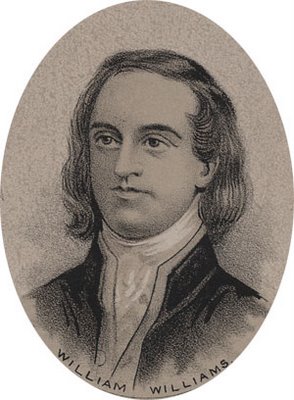
In February of 1771, at nearly forty years old, William married Mary Trumbull, who was twenty-five years old. Mary was the daughter of the Royal Governor of Connecticut, Jonathan Trumbull (who was later the Speaker of the US House of Representatives after the American Revolution). William and Mary had three children together, named Solomon, Faith, and William Trumbull Williams.
In the protests against the British that went on in the colonies before the American Revolution, William was quite active. He was a member of the Sons of Liberty. William also served on Connecticut’s Committee of Correspondence and Council of Safety. William was a committed supporter of the agreements of non-importation that were established in 1769 to oppose the Townshend Acts. He was also against Boston being occupied by British soldiers.
When local merchants decided they were weary of the non-importation agreements and began to ignore them, William was quite disappointed. Even after the Townshend Acts were repealed, except for the tea tax, William still wished those non-importation agreements to be imposed, and he never trusted the intentions of the established local merchants again after that, especially Silas Deane.
In July 1774, a month after Britain imposed the Coercive Acts on Boston to punish the city for its anti-British activities, William wrote and published an “address to the King” in the Connecticut Gazette, using a pseudonym. This ‘address,” which was written as an angry satire, said:
“We don't complain that your father made our yoke heavy and afflicted us with grievous service. We only ask that you would govern us upon the same constitutional plan, and with the same justice and moderation that he did, and we will serve you forever. And what is the language of your answer…? Ye Rebels and Traitors…if ye don't yield implicit obedience to all my commands, just and unjust, ye shall be drag'd in chains across the wide ocean, to answer your insolence, and if a mob arises among you to impede my officers in the execution of my orders, I will punish and involve in common ruin whole cities and colonies, with their ten thousand innocents, and ye shan't be heard in your own defense, but shall be murdered and butchered by my dragoons into silence and submission. Ye reptiles! ye are scarce intitled to existence any longer….Your lives, liberties and property are all at the absolute disposal of my parliament.”
Thanks to his clear patriot beliefs and public (and vocal) support of the patriot cause, William was elected by the colony of Connecticut to replace Oliver Wolcott at the Continental Congress on the eleventh of July in 1776. This was the same day that the colony of Connecticut received official word of the Congress’s vote in favor of independence, which they had voted on on the second of July of that year. William went to Congress, arriving well past the vote on independence, so he did not get to participate in that. He did, though, get the opportunity to sign the Declaration of Independence, which he did, signing the formal copy of the Declaration as a representative for Connecticut.
After the American Revolution, William was a representative from Lebanon, Connecticut, at Connecticut’s convention to ratify the new US Constitution in January of 1788. William had opposed, for the most part, the government of the new United States under the previous Articles of Confederation. In particular, he was a vocal opponent of the agreement made by Congress in 1782 to give five years of full pay and three months of back pay to the officers in the Continental Army but not to the regular, non-commissioned soldiers.
The people of Connecticut disapproved of the proposed Constitution by and large, and William had been instructed to vote against its ratification at the convention. William, as always his own man, chose to vote in favor of it instead. William liked the proposed Constitution, approving of the way it set up a new government for the infant United States. William only had one overt objection to the entire document, and that was its clause in Article VI that banned religious tests for government officials. This protest was due to William’s religious upbringing and his previous intention to become a minister as a young man.
Of William’s objection to the religious test exclusion, the Reverend Charles A. Goodrich wrote:
“Williams made a profession of religion at an early age, and through the long course of his life, he was distinguished for a humble and consistent conduct and conversations. While yet almost a youth, he was elected to the office of deacon, an office which he retained during the remainder of his life. His latter days were chiefly devoted to reading, meditation, and prayer.”
In addition to these illustrious accomplishments, William was a pastor at the First Congregational Church in Lebanon, Connecticut. William also maintained his career as a successful Connecticut merchant.
William spent the rest of his life after the Constitutional Convention as a county court judge in Connecticut. He crossed to the other side in 1811 at eighty and was buried in the Old Cemetery in Lebanon, Connecticut.
William’s house in Lebanon still stands today and is a designated US National Historic Landmark.


